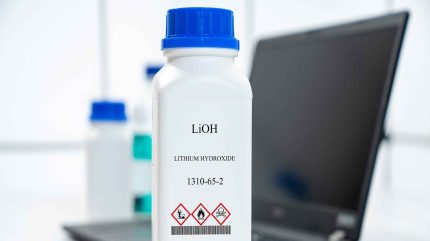
Reed Advanced Materials (RAM), a joint venture between Neometals and Mineral Resources, has entered a non-binding memorandum of understanding (MoU) with Rio Tinto to develop ELi lithium processing technology.
The ELi process is poised to revolutionise lithium hydroxide production by employing electricity instead of large volumes of chemical reagents.

Discover B2B Marketing That Performs
Combine business intelligence and editorial excellence to reach engaged professionals across 36 leading media platforms.
This innovative method offers the potential for significant cost reductions compared with the conventional chemical precipitation process used in the industry.
The agreement outlines several collaborative opportunities including the establishment of a framework for Rio Tinto to assess ELi’s performance through extended testing and the potential negotiation of an evaluation licence.
The collaboration will explore the possibility of Rio Tinto funding optimisation test work and updates to the process design.
The parties may also agree on detailed design and cost estimation for a demonstration plant in Argentina, contingent upon Rio Tinto’s consent.

US Tariffs are shifting - will you react or anticipate?
Don’t let policy changes catch you off guard. Stay proactive with real-time data and expert analysis.
By GlobalDataThese steps are crucial for advancing the technology to ‘Readiness Level 7’ through future trials.
Should the cooperation prove fruitful, Rio Tinto and RAM may also consider establishing a binding agreement for field trials and potentially develop a commercial agreement to apply the ELi process to Rio Tinto’s lithium brine assets.
Neometals managing director Chris Reed said: “We are naturally excited to collaborate with Rio Tinto to explore the potential to bring this technology closer to market. Rio Tinto is a global leader in energy transition commodities with scale, development capabilities and financial strength.
“We are confident ELi can be an ideal complement to Rio Tinto’s direct lithium extraction (DLE) technologies to further enhance the value of their Tier 1 portfolio.”
The technology is due to be licensed to other lithium producers for a royalty fee and promises to significantly enhance the efficiency of upcoming lithium hydroxide monohydrate (LHM) and lithium carbonate (LC) production.
The scope of services provided encompasses various aspects such as the evaluation and issuance of commercial licences, allowing for the utilisation of proprietary technology.
Clients may also receive an all-encompassing technology suite that includes detailed process design specifications, engineering schematics and lists of equipment, among other elements.
Additionally, there may be support services connected to the technology on offer, which involve professional design consultations, guidance during the initiation of operations and aid in enhancing the efficiency of business performance.
Furthermore, Rio Tinto has recently committed C$7.6m (£4.12m) to an industrial demonstration project at its Lac Tio mine in Quebec, Canada.
Supported by a C$2.5m contribution from the Government of Quebec, the project aims to evaluate ore sorting technology that could improve efficiency and reduce environmental impact.





